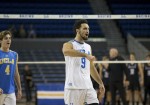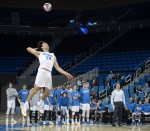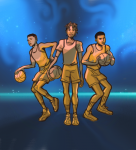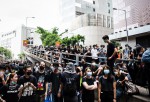Team USA’s roster for the World University Games had UCLA written all over it.
The United States sent representatives for 15 sports to Naples, Italy to compete in the international tournament from July 3 through July 14. 37 Bruin athletes participated in different sports.
Team USA placed fourth overall with 21 gold, 17 silver and 15 bronze medals.
Water Polo
Nine UCLA water polo players traveled as part of team USA. Rising sophomore Jake Cavano, rising junior Felix Brozyna-Vilim, rising junior Evan Rosenfeld, incoming freshman Tommy Gruwell and transfer rising sophomore Sam Krutonog played for the men, and incoming freshman Abbi Hill, rising sophomore Ava Johnson, rising sophomore Val Ayala and rising junior Roxy Wheaton competed on the women’s team.
The women began the tournament with two straight losses to Russia and Italy. They rounded out bracket play with a 14-11 victory over China and an 11-9 losing effort against Australia. Hill said the team went through a rough stretch but regained some confidence from its better efforts.
“Bracket play was rough,” Hill said in an email statement Wednesday. “But I feel like we have some momentum going. I do very much believe that this team is capable of finishing out the tournament strong.”
In the round of 16 play-in match, the U.S. defeated the Czech Republic 25-5. However, it fell to Canada 10-9 in the quarterfinals, and wound up finishing eighth. The four Bruins on Team USA ended up scoring 36 of its 90 goals, including 16 by Hill.
“Having many UCLA athletes (on the national team) showcases how high the level of athletics is at UCLA and how much talent there is,” Hill said in the Wednesday statement.
The U.S. men’s team fared better than the women, running the table in group play by beating Korea, Great Britain, France and Russia by a total goal differential of 48 goals. It then defeated Croatia and Hungary by one and three goals, respectively, earning a spot in the final against Italy.
Team USA was outscored 7-3 by Italy in the first two periods and never recovered, falling 18-7. Cavano contributed 17 goals over the entire tournament, second on the team to Stanford’s Tyler Abramson’s 20 goals.
Women’s Soccer
20 members of UCLA women’s soccer led the U.S. in the Opening Ceremony and went on to place ninth in the tournament.
Rising junior forward Ashley Sanchez – who has played in the FIFA U-17 and U-20 Women’s World Cups for the U.S. – was selected as the nation’s flag-bearer and the rest of her team was right behind her in the opening procession.
Team USA lost its opening two matches, falling 2-1 to host country Italy and by the same score to Japan, before bouncing back to defeat the Republic of South Africa 4-0 to finish out group play. The U.S. then faced Mexico in a match for ninth place, and secured a 3-1 win.
Sanchez, rising junior midfielder Olivia Athens and incoming freshman midfielder Mia Fishel scored two goals each in the team’s four games. Incoming freshman defender Brianne Riley joined Fishel as additions to the starting lineup.
Tennis
Team USA sent three athletes to represent the nation in tennis – and all of them were Bruins.
Rising junior Keegan Smith played men’s singles and mixed doubles with rising junior Abi Altick. Altick also played women’s singles along with rising junior Sophie Bendetti, and the two teamed up for women’s doubles.
Smith won three matches in his run to the men’s singles quarterfinals before falling to Khumoyun Sultanov of Uzbekistan, 6-1, 6-2. In mixed doubles, Smith and Altick won their first match, but pulled out of the tournament before their match in the round of 16.
Bendetti and Altick both lost in the first round of women’s singles, but Altick went on to win five straight matches in the consolation bracket, concluding with a 6-1, 7-6(6) win in the women’s consolation singles final over Vaidehi Chaudhari of India.
Bendetti and Altick won the first of their women’s doubles matches before dropping their second to Great Britain 6-4, 6-2 to end their tournament run.
Men’s Volleyball
Rising redshirt senior Brandon Rattray of UCLA men’s volleyball joined the U.S. men’s volleyball team.
The U.S. started off with consecutive five-set victories over Korea and China, but dropped its next two matches to Russia and Portugal in straight sets. Rattray played in the first three games and recorded 12 kills and a block against China.
Rattray said the high level of competition allowed him to learn more about what skills make players elite.
“I have been watching high-level, international volleyball here on this trip,” Rattray said in a text statement Saturday. “The best players are very good at mixing it up between hard shots, both cross court and down the line, tips and roll shots – it seems easy, but is a lot (easier) said than done.”
After the group stage, Team USA dropped three straight matches to Switzerland, Chile and Argentina to finish 16th out of 16 teams.
“USA Volleyball can elevate their game by providing opportunities for athletes,” Rattray said in the Saturday statement. “Offering opportunities to travel and compete like this is a great way to expand the skill level in upcoming players.”
Table Tennis
Isabel Chu competed for the U.S. table tennis team.
The recently graduated Bruin competed in the women’s team, singles, doubles and mixed doubles competitions. The women’s team dropped both matches in the tournament to Japan and Italy by a score of 3-0.
Chu lost all four of her other matches, two singles and one in each doubles competition. Even though she went winless in the tournament, Chu said it was an honor to help grow table tennis for the United States.
“I’m proud to represent table tennis,” Chu said in a text statement Wednesday. “I hope to bring greater awareness into the intricacies of the sport to the U.S. It’s now growing in the collegiate scene, especially with the help of the National Collegiate Table Tennis Association.”
Chu said the large UCLA representation for all the sports in the World University Games was really comforting.
“I was able to find some other Bruins during the Opening Ceremony. We did the 8-clap and it felt so nice to have a piece of home with me, even on a different continent!” Chu said in the Wednesday statement.
Swimming
Rising senior swimmer Erica Vong was the only international student-athlete competing for UCLA.
Vong represented Macao – an autonomous region of China – in the 100-meter and 50-meter backstroke. Vong won her heat in the 100-meter, but failed to advance to the semifinals or finals in either race, ending her World University Games run.
Taekwondo
Recent graduate Connor Wilson competed for the United States taekwondo squad.
In the -80 kg weight class, Wilson lost his opening round bout to Artur Baimatov of Russia 22-11, stopping his tournament run short in the round of 64.






